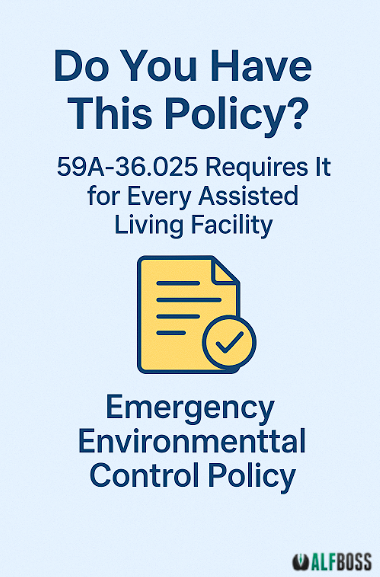
✅ Do You Have This Policy? 59A-36.025 Requires It for Every Assisted Living Facility
Florida law is clear: every assisted living facility must maintain written policies and procedures for emergency environmental control. Under Rule 59A-36.025, it’s not enough to simply have a generator—you must also show, in writing, exactly how your facility will use that generator to keep residents safe when power goes out.
📜 What the Regulation Says
According to 59A-36.025(5), your facility must:
- Develop and implement written policies to activate, operate, and maintain the alternate power source (your generator) and the fuel it requires.
- Ensure procedures are in place so residents do not suffer complications from extreme indoor temperatures.
- Include specific methods in your policies for:
- Using cooling devices and equipment.
- Producing ice and maintaining safe medication storage temperatures.
- Performing wellness checks for dehydration and heat-related injury.
- Obtaining emergency medical intervention if a resident’s life is in jeopardy.
🗂️ Accessibility of Policies
- At the facility: Policies must be readily available at your licensed physical address in either paper or electronic form.
- Readily available means immediate. Staff must be able to produce them upon request by AHCA, surveyors, or other legally authorized entities.
- For residents and their representatives: Policies must also be available for inspection by residents, their families, guardians, or case managers.
🛠️ Compliance Best Practices
- Be specific. Tailor policies to your facility—generator brand, fuel supply, staff roles. Avoid generic templates.
- Train staff. Everyone should know where the policies are kept and how to follow them.
- Run drills. Document practice runs of generator start-up and wellness checks.
- Update regularly. Review and update policies after each storm season, facility change, or generator replacement.
✅ The Bottom Line
59A-36.025 requires more than equipment—it requires a written, detailed, and accessible plan. Having this policy in place is not optional, it’s a regulatory mandate. By keeping policies up to date, staff trained, and records ready for inspection, you ensure both compliance and resident safety.